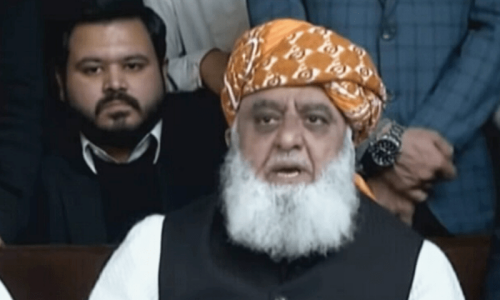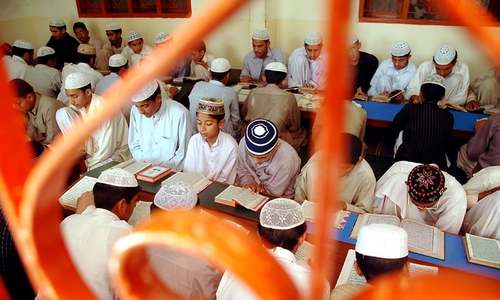• Insists changes may invite criticism or sanctions from bodies like FATF
• Says registering madressahs under Societies Registration Act can fuel sectarianism
• JUI-F accuses presidency of acting under external pressure
ISLAMABAD: As the controversy over the Societies Registration (Amendment) Bill 2024 deepens, President Asif Ali Zardari has cautioned parliamentarians to consider international obligations before altering the existing procedures for registering religious seminaries.
In a letter to Prime Minister Shehbaz Sharif dated Nov 13, 2024, President Zardari warned that changes to the current arrangements could invite criticism and sanctions from global organisations.
“Lawmakers should keep in mind the international environment that when a Madrasah is registered under a society, which has conflicting interests, would invite international criticism/sanctions for Pakistan,” he wrote.
The letter was in response to a reminder sent by PM Shehbaz on Nov 4, urging the president to approve the amendment bill. The prime minister assured that corrections in Para 6 had been made to address earlier objections raised by the presidency.
However, in his reply, President Zardari reiterated his reservations. He argued that bypassing the current procedure for madressah registration could have serious repercussions, including adverse reviews by international bodies such as the Financial Action Task Force (FATF) and might imperil the European Union’s Generalised Scheme of Preferences Plus (GSP+) programme.
The president said that since correction has been made in the bill, as was pointed out in Para 6 of the previous summary, the current summary may be taken as the one sent in taken as the one sent in accordance with Clause 1 of Article 75 of the Constitution and the previous summary may be ignored as the bill was not furnished according to constitutional provisions.
President Zardari also highlighted constitutional and legal inconsistencies in the proposed bill. He pointed out that the original law, the Pakistan Madrasa Education (Establishment and Affiliation of Model Dini Madaris) Board Ordinance, 2001, and the Islamabad Capital Territory Trust Act, 2020, were already in effect. The amendment, he said, does not specify how it would override these existing laws, creating ambiguity.
The president argued that Clause 6 of Section 21 of the amendment could nullify existing laws without appropriate provisions.
“By virtue of amendments by the provinces to the Societies Registration Act, 1860, it has practically become a law for the Islamabad Capital Territory (ICT), yet jurisdiction of the proposed amendment should have been specified that it would be applicable in ICT only to avoid confusion in the implementation of the law,” the president wrote.
He also raised concern about the incompatibility of madressah education with the preamble to the Societies Registration Act, 1860. He pointed out that the Act includes fields such as fine arts, which conflict with madressah education and could lead to legal challenges under Article 227 of the Constitution.
The president warned that registering madressahs under the Societies Registration Act could make societies already established under this law vulnerable to further sectarianism and other divisive tendencies. He also cautioned that allowing multiple madressahs to operate under a single society could create “fiefdoms”.
‘External pressure’
The Jamiat Ulema Islam-Fazal (JUI-F) has strongly criticised the president’s objections. The party, which has been advocating for the bill’s enactment, accused the presidency of acting under external pressure. It said that the president’s objections were surprising and appeared to lack legal standing.
“The president’s objections were not made within the time period of 10 days as given in the Constitution, and the objections made in instalments do not have legal standing,” JUI-F spokesperson Aslam Ghauri said.

He said that the objections should have been sent to the National Assembly speaker, and the ones sent to the speaker had already been answered.
The JUI-F also accused the government of delaying the bill’s enactment, suggesting a conspiracy against religious seminaries. The party has demanded that objections be addressed promptly and the bill enacted without further delay.
The Societies Registration (Amendment) Bill 2024 was passed by the Senate and National Assembly on Oct 20 and 21, respectively. JUI-F had previously sought copies of the president’s objections, which it claimed had been rectified before the bill was returned for presidential assent.
Published in Dawn, December 14th, 2024













































